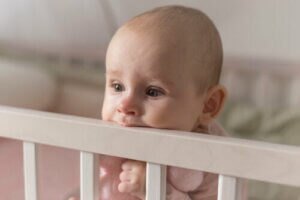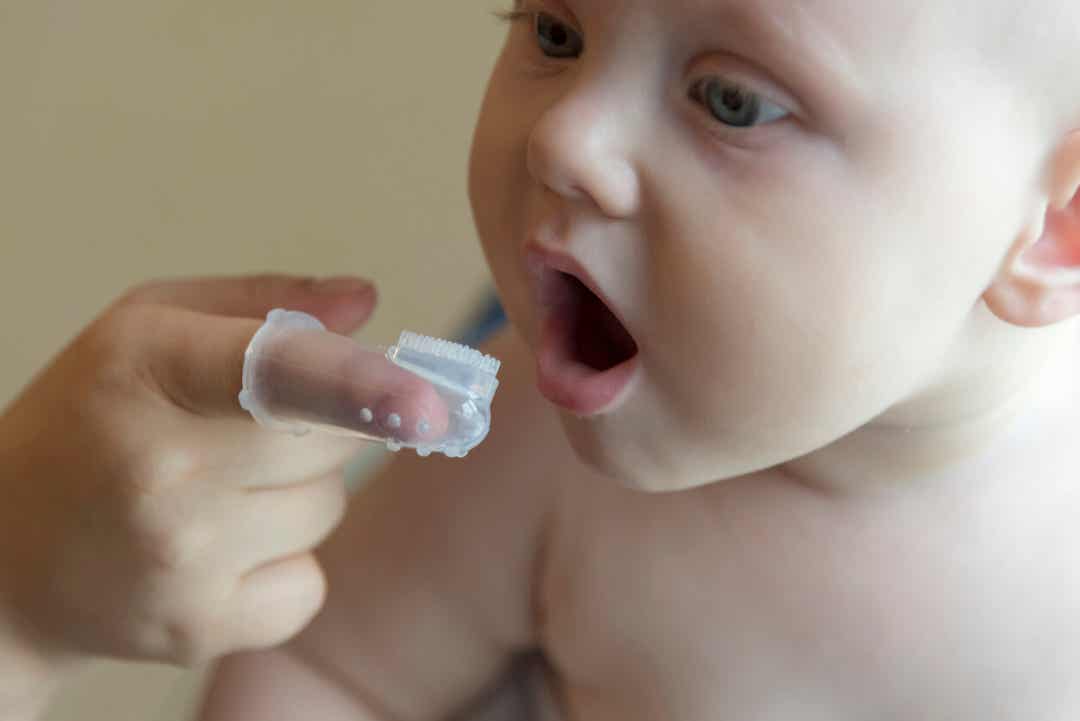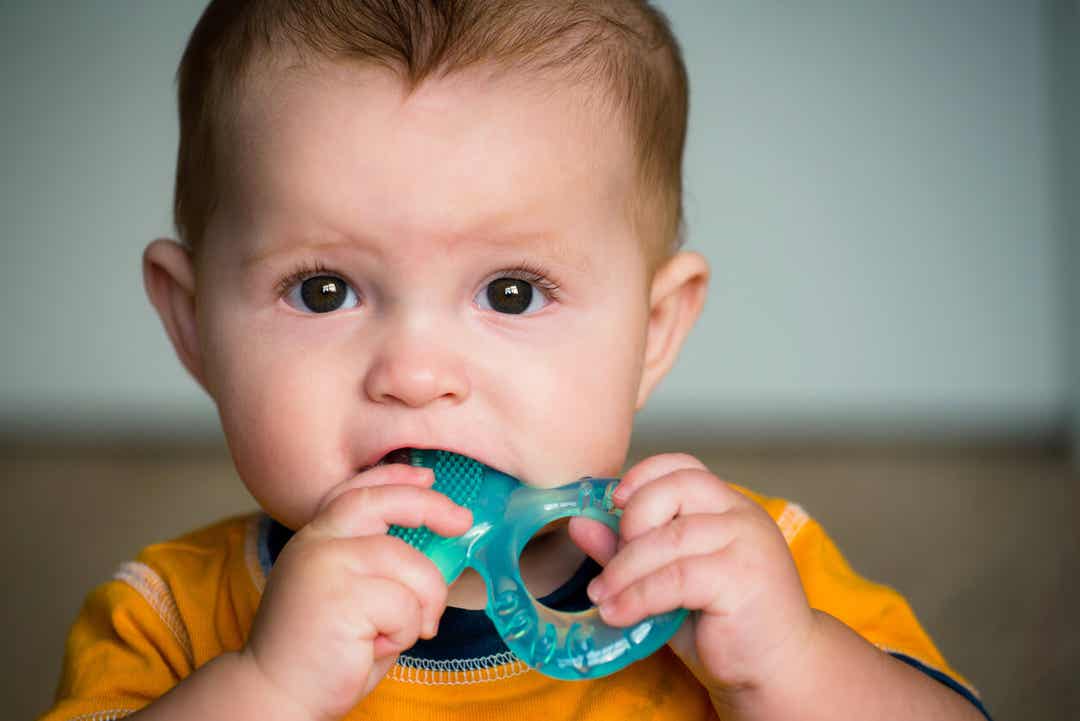Does Teething Affect Children's Sleep?

For some little ones, the appearance of baby teeth takes place without great discomfort. But for others it is a painful time, causing babies to become irritable. But does teething affect how children sleep? Today, we’ll take a look at the issue.
The eruption of baby teeth is a slow and progressive process that usually begins around 6 months of age and ends around 3 years of age. That is why parents should have the knowledge and tools to help their child go through this stage with love and patience.
We’ll tell you how tooth eruption manifests itself and if teething can affect the child’s rest. In addition, we’ll share some tips to make this moment more pleasant.
Symptoms that your baby’s teething
As we already mentioned, the eruptive process usually begins around 6 months of age. However, each little one grows and develops at their own pace; in some, it starts earlier, and in others, it takes a few months longer.
Before the tooth’s visible in the mouth, there are some manifestations that parents may notice in their children that indicate that there’s a tooth about to erupt. These are the following:

- Swelling of the gum or the appearance of a small whitish bump on the gum.
- A need to put everything in the mouth, biting, and rubbing objects against the gums.
- Excessive drooling.
- Irritability, anxiety, and more frequent crying without apparent cause.
- Discomfort when feeding (it may be difficult to breastfeed during these days and the child may refuse to feed).
- Increased nighttime awakenings.
Also, teething may cause a slight rise in temperature, but doesn’t cause fever or diarrhea. If the child presents these symptoms, you shouldn’t attribute them to teething, and you should consult your pediatrician to look for their origin.
How does teething affect children’s sleep?
Although there’s no proof that teething affects children’s sleep, it’s a problem that’s often associated with this stage. Many parents report that their little ones suffer changes at bedtime during the teething process.
For many children, the appearance of baby teeth causes discomfort, pain, and sensitivity in the mouth. These symptoms can contribute to sleep difficulties.
In any case, lack of sleep and not being able to sleep often irritate little ones even more. So, sometimes not falling asleep is actually due to fatigue and frustration at not being able to sleep.
So, the cause of the awakenings of the little ones may not be precisely due to teething. Sometimes, at the same time as teething, other processes occur in children that can come together and cause them to not sleep well. The lack of schedules or a change of routines can be the origin of the problem, for example.
Regardless of whether it’s the teeth or another cause, waking up at night and not being able to go back to sleep will make the child upset due to fatigue. Maintaining a routine and helping the child to fall back to sleep is part of the care that parents should provide. Even if, at that time of the night, it’s a little more difficult.
Tips to soothe your baby
Below, we’ll share some recommendations that can help your baby feel better during the teething process. Also, we’ll provide several tips that can be useful when teething or other factors affect your little one’s sleep:
- Teethers: To calm the need to bite in little ones, it’s best to offer teethers that they can put in their mouth. They come in different textures and consistencies and can be placed in the refrigerator to keep them cold, thus providing additional relief.

- Gum massages: The routine of cleaning the gums with gauze or a silicone thimble can be very pleasant for them at this time.
- Pacifier: If the child is used to using a pacifier, they may need it a little more at this stage.
- Cold food: Cold temperatures help to reduce inflammation in the area and give the sensation of relief. Offer little ones pieces of cold fruit or vegetables if they can already eat on their own, or breast milk ice cream, may be helpful.
- Maintain good habits: Each parent chooses the way their family sleeps. But, if you’ve achieved certain ways of sleeping that are working well for your baby, then it’s best not to make changes. For example, if your child sleeps alone in their crib, it’s best to accompany them and help them to go back to sleep in their own space, instead of moving them to your own bed.
- Medication: In general, medication isn’t necessary. However, sometimes, if there’s a lot of discomfort, your pediatrician may recommend the use of an analgesic.
If teething affects children’s sleep, be patient
There may be several long nights where your little one’s crying and fussy. This may be due to teething, or it may just be that your child needs to get used to a proper sleep routine. Accompanying your child with patience and love is the key to this process. This way, both you and your little one will get through these nighttime episodes in the best possible way.
For some little ones, the appearance of baby teeth takes place without great discomfort. But for others it is a painful time, causing babies to become irritable. But does teething affect how children sleep? Today, we’ll take a look at the issue.
The eruption of baby teeth is a slow and progressive process that usually begins around 6 months of age and ends around 3 years of age. That is why parents should have the knowledge and tools to help their child go through this stage with love and patience.
We’ll tell you how tooth eruption manifests itself and if teething can affect the child’s rest. In addition, we’ll share some tips to make this moment more pleasant.
Symptoms that your baby’s teething
As we already mentioned, the eruptive process usually begins around 6 months of age. However, each little one grows and develops at their own pace; in some, it starts earlier, and in others, it takes a few months longer.
Before the tooth’s visible in the mouth, there are some manifestations that parents may notice in their children that indicate that there’s a tooth about to erupt. These are the following:

- Swelling of the gum or the appearance of a small whitish bump on the gum.
- A need to put everything in the mouth, biting, and rubbing objects against the gums.
- Excessive drooling.
- Irritability, anxiety, and more frequent crying without apparent cause.
- Discomfort when feeding (it may be difficult to breastfeed during these days and the child may refuse to feed).
- Increased nighttime awakenings.
Also, teething may cause a slight rise in temperature, but doesn’t cause fever or diarrhea. If the child presents these symptoms, you shouldn’t attribute them to teething, and you should consult your pediatrician to look for their origin.
How does teething affect children’s sleep?
Although there’s no proof that teething affects children’s sleep, it’s a problem that’s often associated with this stage. Many parents report that their little ones suffer changes at bedtime during the teething process.
For many children, the appearance of baby teeth causes discomfort, pain, and sensitivity in the mouth. These symptoms can contribute to sleep difficulties.
In any case, lack of sleep and not being able to sleep often irritate little ones even more. So, sometimes not falling asleep is actually due to fatigue and frustration at not being able to sleep.
So, the cause of the awakenings of the little ones may not be precisely due to teething. Sometimes, at the same time as teething, other processes occur in children that can come together and cause them to not sleep well. The lack of schedules or a change of routines can be the origin of the problem, for example.
Regardless of whether it’s the teeth or another cause, waking up at night and not being able to go back to sleep will make the child upset due to fatigue. Maintaining a routine and helping the child to fall back to sleep is part of the care that parents should provide. Even if, at that time of the night, it’s a little more difficult.
Tips to soothe your baby
Below, we’ll share some recommendations that can help your baby feel better during the teething process. Also, we’ll provide several tips that can be useful when teething or other factors affect your little one’s sleep:
- Teethers: To calm the need to bite in little ones, it’s best to offer teethers that they can put in their mouth. They come in different textures and consistencies and can be placed in the refrigerator to keep them cold, thus providing additional relief.

- Gum massages: The routine of cleaning the gums with gauze or a silicone thimble can be very pleasant for them at this time.
- Pacifier: If the child is used to using a pacifier, they may need it a little more at this stage.
- Cold food: Cold temperatures help to reduce inflammation in the area and give the sensation of relief. Offer little ones pieces of cold fruit or vegetables if they can already eat on their own, or breast milk ice cream, may be helpful.
- Maintain good habits: Each parent chooses the way their family sleeps. But, if you’ve achieved certain ways of sleeping that are working well for your baby, then it’s best not to make changes. For example, if your child sleeps alone in their crib, it’s best to accompany them and help them to go back to sleep in their own space, instead of moving them to your own bed.
- Medication: In general, medication isn’t necessary. However, sometimes, if there’s a lot of discomfort, your pediatrician may recommend the use of an analgesic.
If teething affects children’s sleep, be patient
There may be several long nights where your little one’s crying and fussy. This may be due to teething, or it may just be that your child needs to get used to a proper sleep routine. Accompanying your child with patience and love is the key to this process. This way, both you and your little one will get through these nighttime episodes in the best possible way.
All cited sources were thoroughly reviewed by our team to ensure their quality, reliability, currency, and validity. The bibliography of this article was considered reliable and of academic or scientific accuracy.
- Ayala Pérez, Yolanda, Leyanis de la Caridad Carralero Zaldívar, and Beatriz del Rosario Leyva Ayala. “La erupción dentaria y sus factores influyentes.” Correo Científico Médico 22.4 (2018): 681-694. http://scielo.sld.cu/scielo.php?pid=S1560-43812018000400013&script=sci_arttext&tlng=en
- Alata Anamaría, Rolando. “Desarrollo y erupción dental.” (2019). http://repositorio.uigv.edu.pe/handle/20.500.11818/4729
- de la Teja Ángeles, Eduardo. “Erupción dentaria.” (2019). http://189.203.43.34:8180/handle/20.500.12103/1576
- de Luna, G. Orejón, and MJ Esparza Olcina. “La erupción dentaria primaria,¿ realmente produce tantos síntomas?.” (2016). https://fapap.es/files/639-1443-RUTA/08_Erupcion_dentaria.pdf
- Fogel, Claudio Gabriel. “Signos y síntomas atribuidos a la erupción dentaria en los niños: primera parte.” Archivos argentinos de pediatría 102.1 (2004): 35-43. https://www.sap.org.ar/docs/publicaciones/archivosarg/2004/A3.185-189.pdf
- de Holanda Teixeira, Rangel Bastos, Dayse Andrade Romão, and Mariana Alencar Nemezio. “Evaluación de la relación de los signos y síntomas durante el período de erupción de los dientes primarios.” Revista de Odontopediatría Latinoamericana 9.2 (2019): 9-9. https://revistaodontopediatria.org/index.php/alop/article/view/173
- Rojas Rueda, Silvia Marcela, Gloria Ángela Carrillo Estrada, and Ángela Suarez Castillo. “Manifestaciones locales y sistémicas de la erupción dental en niños de 0 a 36 meses de edad: revisión sistemática de la literatura.” https://repository.javeriana.edu.co/handle/10554/53598
- Marcillo Zambrano, Janina Lizbeth. “Prevalencia de síntomas asociados a la erupción primaria en lactantes, de 6 a 12 meses en el centro de salud Sangolquí.” (2016). https://repositorioslatinoamericanos.uchile.cl/handle/2250/2792781
- Pentón, Armando San Miguel, Olga Lidia Véliz Concepción, and Raiza Zenaida Escudero Alemán. “Erupción dentaria,¿ está todo dicho?.” Acta Médica del Centro 11.1 (2017): 72-75. https://www.medigraphic.com/cgi-bin/new/resumen.cgi?IDARTICULO=69646
This text is provided for informational purposes only and does not replace consultation with a professional. If in doubt, consult your specialist.








